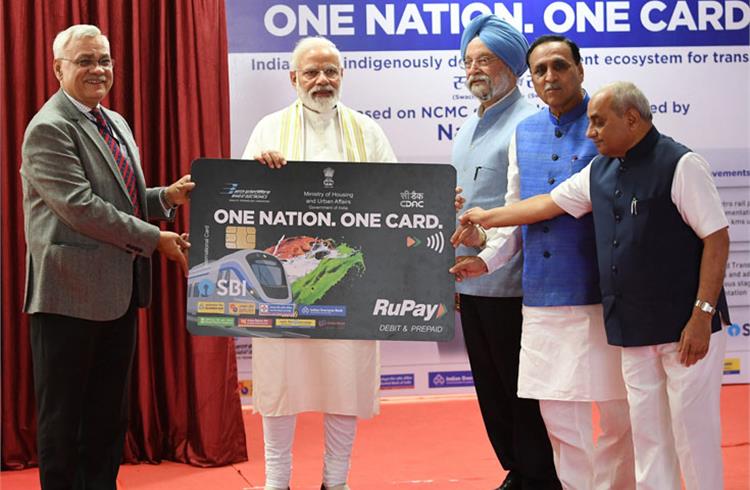One Nation, One Card introduced for multi-modal public transport in India
The ard supports offline transaction across all travel needs with minimal financial risk to involved stakeholders.
The prime minister of India, Narendra Modi launching the One Nation, One Card for transport mobility in Ahmedabad, Gujarat on March 4, 2019. The PM was joined by Vijay Rupani, chief minister of Gujarat; Hardeep Singh Puri , minister of State for Housing and Urban Affairs (I/C); Nitinbhai Patel, deputy chief minister of Gujarat and the secretary, Ministry of Housing and Urban Affairs, Durga Shanker Mishra.
In a bid to boost seamless travel in India, prime minister Narendra Modi launched the 'One Nation, One Card' christened National Common Mobility Card (NCMC) in Ahmedabad yesterday. The first indigenously developed payment platform will enable a single card for seamless travel through different metros and other transport systems in the country.
The payment ecosystem for transport consists of NCMC Card, Sweekar (Swachalit Kiraya: Automatic Fare Collection System) and Swagat (Swachalit Gate) and is based on NCMC standards. These cards will be issued by banks on Debit/Credit/Prepaid card product platform, which will enable the customer to use this single card for payments across all segments including metro, bus, suburban railways, toll, parking, smart city and retail. The government says the stored value on the card supports offline transaction across all travel needs with minimal financial risk to involved stakeholders. The service area feature of this card also supports operator-specific applications e.g. monthly passes and season tickets.
The central government says public transport, which is extensively used across the country, is one of the most economical and convenient modes of commuting for all classes of society. While cash continues to be the most preferred mode of fare payments across public transport, there are multiple challenges associated with the system for instance, cash handling, revenue leakages and cash reconciliation among others.
To address this, various initiatives have been taken by transit operators to automate and digitise the fare collection using the Automatic Fare Collection System (AFC). The introduction of this closed loop cards issued by these operators helped digitise the fare collection to a significant extent, however the restricted usability of these payment instruments limits the digital adoption by customers.
The AFC System (gates, readers/validators, backend infrastructure) is the core of any transit operator to automate the fare collection process. The government says the major challenge associated with the AFC system implementation in India till now is the lack of an indigenous solution provider, as the systems deployed at various Metros are from foreign players. In order to avoid the vendor lock-in and create an interoperable system, there was a need to develop indigenous standards and AFC system under 'Make in India' initiative.
A committee was formed with representatives from the National Informatics Centre (NIC), Centre for Development of Advance Computing (C-DAC), Bureau of Indian Standards (BIS), National Payment Corporation of India (NPCI) and the Ministry of Finance with an objective to develop the vendor-agnostic interoperable ecosystem for NCMC including indigenous AFC System and banking interface.
While NPCI was given the mandate to develop the specifications for card and terminal to support the NCMC ecosystem, CDAC was entrusted the task of finalisation of NCMC specification for AFC system including the interface with Bank server. Thereafter, BEL was roped in for making gates and reader. This is also the first indigenous payment reader which has been certified as per international standards. India joins the very few elite nations who have indigenous capacity on gate and reader production.
NCMC Ecosystem offers the value proposition for customers as they need not to carry multiple cards for different usage. Further, the quick contactless transactions will improve the seamless experience. For operators, NCMC ecosystem brings common standards for implementation without vendor lock-in.
This the government says will also help in higher digital payments penetration, savings on closed loop card lifecycle management cost and reduced operating cost. The rich data insights may be used by operators for business intelligence leading to efficient operation.
In order to showcase the entire NCMC ecosystem for digital fare collection, the complete AFC system has been deployed in Delhi Metro Rail Corporation (DMRC) across few stations for field trial purpose. Under this pilot, NCMC compliant gates have been deployed at various stations of DMRC and cards have been issued by multiple banks to the users.
The pilot at DMRC was inaugurated by MoHUA on January 31, 2019, which it says will help improve hardware reliability and fine tuning of the software. This will also facilitate large scale indigenous production and deployment in Indian transit system. The first-level trials have been successfully completed in collaboration with CDAC, BEL, NPCI and SBI.
RELATED ARTICLES
IIT Bombay inaugurates Arun Firodia Research Floor
IIT Bombay, one of India’s top technical and research institutions, honours Kinetic Group chairman Dr Arun Firodia, one ...
Maruti Suzuki expands capacity at Manesar plant by additional 100,000 units
New assembly line at Plant A expands total manufacturing capacity at the Manesar plants to 900,000 units per annum. Alon...
Hyundai and Kia partner Exide Energy to produce LFP batteries in India
Partnership with Exide Energy enables Hyundai Motor and Kia to equip future EVs in the Indian market with locally produc...





 By Autocar Pro News Desk
By Autocar Pro News Desk
 05 Mar 2019
05 Mar 2019
 13769 Views
13769 Views









